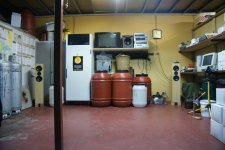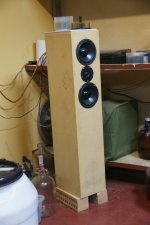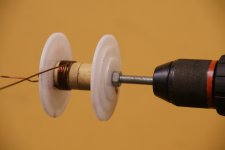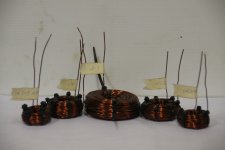Fello fanatics
I would like some input re inductor winding I am at present putting together a 7.1 av system, I have designed the speakers using bass box pro and xo calculator the towers are in a mtm format which has a bass driver in the lower dived section it is to crossover at 240hz
According to the calculated inductor from xo pro I need to wind a coil of awg 16# at 5.5mh this is a large component that would offer some resisentce of flow to the speakers, I would also assume that there would be a decrease in efficiency (db)
That aside has anyone had any success in producing there own coils
I spent approximately four hours yesterday winding and have fabricated 10 coils
The hardest part of this process is getting the wire to feed onto the bobbin evenly and to keep count at the same time
I also noticed that if they are no wound tightly enough there is a lot of differential in meter readings, after some time I managed to get good results but I still had to unwind wire to get back to the desired mh readings
I will mention that if I zipped tied them really tightly together, the meter readings would increase which is probably why we pay so much for the perfect lay inductors
I had to pick up some more wire to day and was talking with the owner of the rewind business I mentioned re problems with inconsistency in readings and he said to me why don’t you wind so far then use the alligator clips on your meter to scratch into the varnish and take a reading that way you will not use so much wire up by having to trim each time you wind just a light spray of varnish to cover your scratches and away you go (tricks of the trade)
Has any one used two pack glue to secure the coils once they have finished winding as it takes a lot of cable ties to secure my coils?
Has anyone fabricated the impedance equalization circuits that are suggested in xo pro software as these can become very expensive when you add up all of the bipolar caps, inductors and resistors necessary to complete the circuit, I was considering building the main crossover then adding the equalization circuits after to see if there is any audible difference as I am not privee to expensive metering equipment
has any one taken readings with there own diys then replaced with factory wound items,was there any noticable in/decrease in proformance!
Any input would be greatly appreciated
Cheers to more beers Speedie
I would like some input re inductor winding I am at present putting together a 7.1 av system, I have designed the speakers using bass box pro and xo calculator the towers are in a mtm format which has a bass driver in the lower dived section it is to crossover at 240hz
According to the calculated inductor from xo pro I need to wind a coil of awg 16# at 5.5mh this is a large component that would offer some resisentce of flow to the speakers, I would also assume that there would be a decrease in efficiency (db)
That aside has anyone had any success in producing there own coils
I spent approximately four hours yesterday winding and have fabricated 10 coils
The hardest part of this process is getting the wire to feed onto the bobbin evenly and to keep count at the same time
I also noticed that if they are no wound tightly enough there is a lot of differential in meter readings, after some time I managed to get good results but I still had to unwind wire to get back to the desired mh readings
I will mention that if I zipped tied them really tightly together, the meter readings would increase which is probably why we pay so much for the perfect lay inductors
I had to pick up some more wire to day and was talking with the owner of the rewind business I mentioned re problems with inconsistency in readings and he said to me why don’t you wind so far then use the alligator clips on your meter to scratch into the varnish and take a reading that way you will not use so much wire up by having to trim each time you wind just a light spray of varnish to cover your scratches and away you go (tricks of the trade)
Has any one used two pack glue to secure the coils once they have finished winding as it takes a lot of cable ties to secure my coils?
Has anyone fabricated the impedance equalization circuits that are suggested in xo pro software as these can become very expensive when you add up all of the bipolar caps, inductors and resistors necessary to complete the circuit, I was considering building the main crossover then adding the equalization circuits after to see if there is any audible difference as I am not privee to expensive metering equipment
has any one taken readings with there own diys then replaced with factory wound items,was there any noticable in/decrease in proformance!
Any input would be greatly appreciated
Cheers to more beers Speedie
Man, what's the diy world coming to? Lots of speaker builders wind their own inductors with fine success. I usually use cable ties, but have potted some smaller inductors in epoxy. Works fine. I don't worry about the couple feet of wire lost when used to trim the value. In the grand scheme of things it's not much, and I find other uses for it. To keep track of winding I built a winding fixture. This is nothing more than a flat plate that supports a block running a shaft. It has a crank on one end (that would be me) turning a crank, and a Jacobs drill chuck on the other. You put whatever form or arbor in the chuck and crank away. Now, the useful part is that I mounted a Veeder-Root counter on top so I don't have to count turns. Even better, it's the style that goes forward and backwards, so it keeps track as I unwind and fiddle around with Mylar tape when winding things like pot core inductors and transformers. To gild the lily, I put a fold out piece of sheet aluminum on one corner that has some stabilizing grooves filed in. This provides a nice place to scrape the enamel off the ends of the inductor wire.
Speedie
I make all my own inductors and have done for a long time.
I use an Avo LCR meter to check the inductance.
I have made air cored and solid cored inductors and never had a problem. I have not found it that important to add the turns precisely. I usually set them in glue when completed.
Don
I make all my own inductors and have done for a long time.
I use an Avo LCR meter to check the inductance.
I have made air cored and solid cored inductors and never had a problem. I have not found it that important to add the turns precisely. I usually set them in glue when completed.
Don
Speedie
I have not found it that important to add the turns precisely.
Don
Only if you can measure the final result. If you have to go strictly by calculations you need to keep precise track of it.
Let's see here.... average cost of inductors -$20. Cost of a home-brew special $2. DMM that measured inductance (as well as everything else) - $100. How many inductors before it pays for itself?
DMM that measured inductance (as well as everything else) - $100. How many inductors before it pays for itself?
I procrastinated for years over buying an LC meter - because they ARE expensive compared to avo meters; finally had a bit of extra money & decided to buy one as an extravegance. A VERY useful tool for all kinds of projects (but then I do a wide variety of playing, not only speakers).
I had an old HP vector Z meter that I used for years until it finally bit the dust. When it finally refused to start up at all the order went out for a $95 DMM that measures L and C. Years ago before copper prices went nuts I bought about $500 worth of magnet wire at wholesale - pretty much a lifetime supply. I was ahead on inductor cost after building my first PA rig.
Hi
I use an LCR meter not a DMM. The AVO LCR cost US$30 on e bay and it is also useful for measuring capacitance which most meters can not measure.
I think they are a good buy.
Also in my experience you will find it difficult if not impossile to get accurate inductance on a diy inductor without measuring.
Don
I use an LCR meter not a DMM. The AVO LCR cost US$30 on e bay and it is also useful for measuring capacitance which most meters can not measure.
I think they are a good buy.
Also in my experience you will find it difficult if not impossile to get accurate inductance on a diy inductor without measuring.
Don
Thanks for your valued input so far
I have never attempted to wind my own inductors before and after reading about the process thought that I would try it
Yes I agree with some of the comments re LCR meter costs on initial buy but I look at it as another invaluable tool in my kit
When I looked at the costs for solen 5 mh coils and higher it did seem to be an area that I could save on as most diys would think on similar lines
With my rig that I am using I have a spool of 16# wire on a roller which I feed the wire onto a bobbin that I fabricated this is powered by a battery drill now if the drill had a counter on it,it would make life a lot easier
Magura thanks for your reply but were would I search for your input
I have never attempted to wind my own inductors before and after reading about the process thought that I would try it
Yes I agree with some of the comments re LCR meter costs on initial buy but I look at it as another invaluable tool in my kit
When I looked at the costs for solen 5 mh coils and higher it did seem to be an area that I could save on as most diys would think on similar lines
With my rig that I am using I have a spool of 16# wire on a roller which I feed the wire onto a bobbin that I fabricated this is powered by a battery drill now if the drill had a counter on it,it would make life a lot easier
Magura thanks for your reply but were would I search for your input
Magura thanks for your reply but were would I search for your input
Here at the DiyAudio.com forum.
Upper right corner sports a search menu.
You could also begin from here:
http://www.diyaudio.com/forums/search.php?searchid=26334
Magura
Magura i used your name as suggested along side with inductors,winding of,readings for etc. there are plenty of posts be could not locate yours
I see the link in my post above is not working, so you're partly excused I guess
http://www.diyaudio.com/forums/showthread.php?t=104194&highlight=inductor+winding
There are many more, this is just the first I stumbled on.
Magura
For inductors larger than 1.5mH or so, I consider using transformer I (eye)lamination's, should reduce Rdc and copper by heaps. Look at commercial offerings for ideas here. Sources can be a problem for most unless your re-winder has contacts.
Unless for low power application stick with air core ....
- Status
- This old topic is closed. If you want to reopen this topic, contact a moderator using the "Report Post" button.
- Home
- Design & Build
- Parts
- diy inductors



